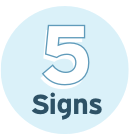RA DISEASE ACTIVITY CAN FLUCTUATE OVER TIME
Rheumatoid arthritis (RA) can be unpredictable. While the exact causes are not fully understood, inflammation resulting from RA in the body may ebb and flow over time. This measure of inflammation and symptoms is commonly known as disease activity.

Here are 5 signs that your RA treatment may not be keeping your disease under control. Learn what they are, and what to do about it »
What different levels of disease activity may mean.
Since rheumatoid arthritis is different for everyone, its disease activity in the body can fluctuate with or without medication. These changes can directly impact the level of symptoms you experience. Sudden episodes of increased inflammation and symptoms is often called a flare, or flare-up.
High disease activity
Inflammation is high; symptoms and pain are debilitating
Moderate disease activity
Inflammation, pain, and symptoms are present and burdensome
Low disease activity
Inflammation, pain, and symptoms are reduced, but noticeable
Remission
Little to no inflammation, pain, or symptoms are present; RA is still present
While attaining remission doesn't mean you no longer have RA, it does mean that reducing inflammation can help you achieve and maintain little to no symptoms by appropriately managing your rheumatoid arthritis.
A rheumatologist can determine if you have achieved remission using a variety of tools and tests. To help your rheumatologist assess the severity of your RA, take the RAPID3 before your next appointment »
INCREASED RA
INFLAMMATION
COULD
MEANIT'S TIME
TO TALK
TO
YOUR
RHEUMATOLOGIST
“It’s a shocking moment when your family is hurting for you.”
Experiencing rheumatoid arthritis flares—or sudden episodes of increased inflammation and symptoms—can be a common part of life with RA. Sometimes they are caused by a known trigger, like a day of household chores. But often, what triggers a flare-up is unclear.
While it can be tempting to power through the pain, ignoring repeated flares can make it more difficult to manage your RA over time, and even increase your risk of joint damage. Learn more about effective RA treatment plans to help you have a more informed conversation with your rheumatologist »

Did you know that treating RA sooner can help increase the likelihood of achieving remission?
Did you know that treating RA sooner can help increase the likelihood of achieving remission?
A rheumatologist can help you find an effective treatment plan to help you aim for the goal of remission—or little to no symptoms. Don’t have a rheumatologist?
Reduce your inflammation for effective RA symptom relief.
Inflammation in RA occurs when your immune system mistakenly attacks your joints, which can cause painful symptoms. While many medications can relieve pain, RA treatment should also effectively reduce inflammation. If not treated effectively, inflammation can lead to reduced joint mobility, chronic joint pain, and permanent joint damage.
To reduce risk of joint damage, talk to your doctor to make sure that your RA treatment is effectively reducing inflammation.



If you are experiencing repeated flares, it may be time to consider a different treatment approach with a rheumatologist.
Telling your rheumatologist how RA impacts your everyday activities and your personal goals for RA treatment can help them create a more effective treatment plan.
My RA Check-In is a simple self-evaluation designed to help you communicate these things at your next appointment for a more meaningful conversation.

